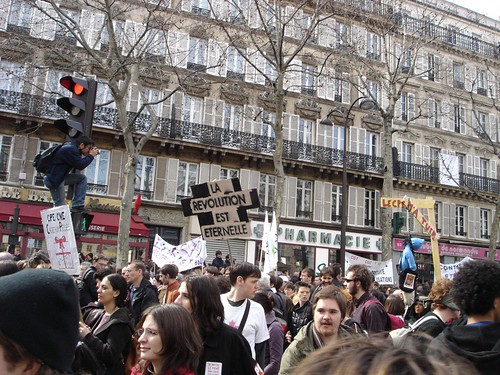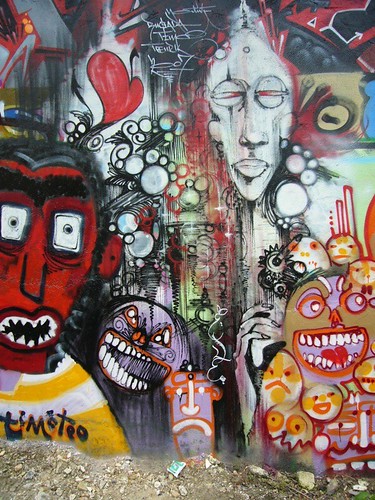Category: "Post-fieldwork"
14/05/10
Home Migration and the City: New Narratives, New Methodologies – here I come!
22/09/08
Ouch!
Ouch! High summer is long gone! Clearly, it’s autumn out there: The air is brisk, the sun is lower in the horizon and red, orange and yellow have started to invade the greenery. Not only do I not particularly like autumn (however nice the weather might be, it never escapes melancholic undertones), but also do I not like to get surprised by how fast time passes. And high summer is ages ago!
10/07/08
One year ago today…
Today, it is one year since I packed my bags and left the field. I left a little earlier than planned because the field exhausted me and I wanted some calm. The last ten days I had lived in an hotel, because the letting contract had run out and I was not in the mood, nor had the energy, nor the extravertness to ask any of my acquaintances for a place to stay. After sleeping 6 months on the world’s hardest futon four floors above the madness of Rue du Faubourg du Temple, the crammed hotel room with thin walls and slamming doors almost felt like a relief. Instead, I think it was the nature of the fieldwork itself that exhausted me.
In London, I lived in a great flat share (in such a lovely British terraced house with blackbirds, squirrels and cats in the greenery outside my window), where I could withdraw from the maelstrom of the field for some hours or a day or two, with people to share my frustrations and find inspiration. In Paris, I had nothing but aloneness – and probably quite a lot of loneliness – when I refuged from the field. In addition, the field itself was several levels more advanced than what I had sharpened my anthropological tools on in London.
My command of French limited, but had I not chosen to study a group of people whose force was their command of language, game of words and poetry? In London, practically all my “informants” were my peers, in terms of level of education and to some extent social background, and they were no more than ten years older or younger than me. In Paris, the majority hadn’t even finished 12 years of schooling and only a handful had been to university. Instead, many had been through a whole different school of life than I could imagine. In terms of age, they ranged from 20 years younger to 35 years older. Moreover, while my focus of study had been of great interest to the people concerned in London, I never really felt that that was the case in Paris. Perhaps it was the language that made me qua researcher far more interesting to spend time with in England than in France, perhaps it was the subjects of concern, or perhaps it was just the French tradition of liaisons that rarely let me qua femme (et blonde et exotique en plus) retreat in favour of the researcher and even friend. I wouldn’t say that this fieldwork demanded black belt in professional and language skills and social sagacity, but it demanded enough to make me so exhausted in the end that I voluntarily left Paris more than two weeks before schedule. But it was really an awful summer anyway. And besides, I had important business to sort out at home.
After an autumn of absence, the field started coming back to me. When I hurried through my old neighbourhood in East Paris for a quick coffee by Canal Saint Martin on my way back from Corsica to Oslo in the spring, I realised how much I missed the atmosphere. What atmosphere? I can’t say for the moment, but that particular feel the streets of North East Paris instigate is something I grapple with in my writing at the moment. The sheer diversity of human beings and activities everywhere at all times, the history, beauty and grandeur emanating from the buildings and boulevards, the touch of anarchy and creativity in the street art and street life… I don’t know, but there is a difference. It was very hard to live it, but I really miss it. Now, for the time being, I’ll have to make do with trying to describe it.
17/03/08
Steps to an analysis: from impressions to data
After I mapped out an outline two and a half months ago, my project has appeared amazingly ordered and under control. Perhaps it’s no wonder then, that I’ve postponed delving back into my fieldnotes for as long as I could, keeping myself busy with ordered and controllable intellectual activities like reading books for literature seminars and writing abstracts for upcoming workshops and conferences as well as even an article.
20/02/08
Yes, my research blog is really supposed to continue…
Three recent events have inspired me to get this blog going again. The last drop must have been a post by the incredibly prolific research blogger Mary Stevens. In her last post, she tells about her PhD viva and her examiners’ interest in her research blog:
One of the things they were particularly interested in - and of which I didn’t make that much in my write-up - was this blog and the specific contribution it had made to the research experience. I talked about the inspiration, in particular C. Wright Mills‘ idea of the research file, and how it helped extend my presence in the ‘field’ into the virtual arena. Overall, they seemed to think that in an ideal world all researchers would be blogging, as a way of communicating their research to their peers and to the general public, and as a means to keep a kind of intellectual diary. Their enthusiasm has inspired me to find some way to carry on, although I suspect in a new form, as I think this blog has outlived its usefulness (as my failure to post over the last few months has amply illustrated). (Read the whole post on Mary Steven’s blog here.)
As I’ve been chronicling my experiencing continuously, I feel I shouldn’t stop now: The strange things happening after leaving the field, when experiences are turned into data and written documentation, are of course as part and parcel of the research process as is the hanging around in Paris-life I was writing about until last summer. But until now I haven’t
The second event spurring me on to continue blogging, was a brief remark from one of my colleagues who recently got back from his fieldwork: “It’s funny how your friends slowly turn into your informants when you get back to academia and start writing up,” he said. How right! That uncomfortable fact is exactly what’s been churning around in my mind for months now, and I feel it’s urgent to voice this phenomenon/experience in a research blog at this stage.
The third event is the sheer joy and inspiration it gives me to read the research blogs from some of the Master students I was teaching in the spring who now are out in the field all over the world: Rakel blogs (with photos!) from Malta, Nina from Cuba and Inger from India (I think she’s a photographer, ‘cos her photos are really incredible)…
Ah finally, there it’s done, my first post for more than three months…
26/10/07
Eerie post-fieldwork experiences: Norwegian Anthropologists’ Facebook association
Facebook hit Norway like a meteorite while I was in Paris (where, by the way, Myspace was the big thing). With 404 508 members, this tiny country with only 4,5 million inhabitants constitute one of the larges regional networks on Facebook (Norway). I still haven’t really discovered what’s so great about Facebook yet (by contrast I got hooked on Flickr immediately and can still spend so many hours immobile in front of the photo sharing utility that my eyes get sore from forgetting to blink and my shoulders stiffen.) Anyway, in my slow and trying attempts to catch up on what everybody here were doing in the spring – while I was watching other people tending other sheep in other valleys (e.g. surfing on Myspace) – I stumbled upon the Norwegian anthropologists’ Facebook association (Norske antropologers fjesbokforening). And what do I find, after a short presentation of the association and a handful of links to informative sites (where of course the incredible antropologi.info by Lorenz is on top)? Yes, a link proclaiming in capital letters: PARTICIPANT OBSERVATION ON YOUTUBE. It’s me, with a poem by the Norwegian author Jens Bjørneboe, first in French translation, then a little more comfortably in the original Norwegian version. My mate Lorent who sat next to me, suggested taking over the camcorder when the maître de cérémonie Dgiz introduced me (to my surprise), so he filmed the whole séance.
It’s incredible strange to watch this video now, in my own living room, so removed from Bellevillian fieldwork as I can be. I’ve just come back from the Cinemateket (Scarface, 1933 – the remake, with Al Pacino, is said to be a cult movie for the kids in the deprived Parisian suburbs). It’s a quiet Friday evening. Outside, it’s almost frosty, but the streets were full of people on their way to a party or a “vorspiel” when I cycled through town, like always in the weekends. So, in the middle of this, my typical Oslo life, I get reminded of my own participation in a poetry slam in haut Belleville five-six months ago. It’s funny to see my nervousness, hear the applause, see how I first forget to get the ticket (for a free drink) like so many slammers often do, then how Dgiz smiles after he has given it to me, then, finally, my big smile of relief towards Lorent after sitting down again. It’s funny to be back at L’Atelier du Plateau and this soirée, and it’s incredibly funny – yes, eerie – to have found the link on that Facebook site, inscribed in the heart of this internet community of young Norwegian anthropologists, as an example of participant observation.
08/09/07
Existence! Resistence! ...eh back in Oslo

4th of April 2006, from one of the many demonstrations against the new labour law
It’s almost two months since I left Paris and time is overdue to get going with the second phase of this blog. One thing is certain; one will always have Paris, but for the time being it will be a long-distance relationship, slowly withering into a mythical landscape which hopefully will help me making some anthropological sense of it. (A landscape I hope will be fuller of poetry and revolt, than social organisation, cultural artefacts and postcolonial theory :-) ).




